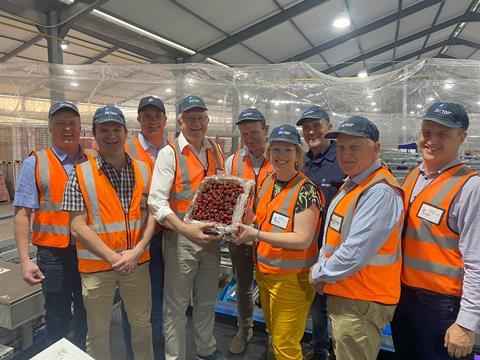Pressure is mounting from leading fruit producers and marketing groups over the privatisation of the terminal

Stakeholders from Tru-Cape, Ceres Fruit Growers, Two-a-Day Group, Dutoit Agri and Link Supply Management have met with the Western Cape premier Alan Winde to discuss the road forward for Cape Town’s port.
Winde was accompanied Mireille Wenger, Western Cape provincial minister of finance and economic opportunities, and other government officials.
“While it is clear that privatisation is the only solution to the challenges in the Cape Town port, Tru-Cape Fruit Marketing has welcomed steps taken by the Western Cape government to mitigate risks for the current fruit harvesting season,” said Tru-Cape in a statement.
Calla du Toit, fruit producer from Ceres and procurement manager at Tru-Cape, said he was positive about the future of the industry.
“There is a new generation of producers with energy, passion and the mindset to overcome challenges, but the one thing that we cannot fix ourselves is the port,” he commented.
“I believe the South African food industry is at a point where we can be truly competitive in the global food business, but we are frustrated and we need help to solve the issues in the Cape Town port.
“Time is running out, and that industry can’t afford another three to five years before they see results’” he noted.
Inefficiencies in the port
At the meeting, held at the offices of Dutoit Agri in Ceres, Chris Knoetze, managing director of Link Supply Chain Management, pointed out that the inefficiency of the port of Cape Town was costing the economy billions of rand every year.
“There is no investment in infrastructure,” he said. ”There are no rubber-tyred gantry cranes (RTG’s), straddle carriers, terminal trucks and chassis on the ground to move the containers and get a flow of the containers into the vessels and get it loaded from the vessels.”
Other problems included the poor maintenance of equipment and the loss of specialised skills in Transnet, impacting on the organisational capability to adjust and make plans when wind cause delays.
“According to a benchmarking study recently published by the Port Regulator of South Africa, anchor waiting time (time vessels spend outside the port) increased by 500 per cent between 2016 and 2022,” Knoetze outlined. “During the same time crane moves (productivity queue side) reduced by 50 per cent and the turnaround time of vessels takes 150 per cent longer.”
The consequences of inefficiency was directly impacting on ocean freight rates, he continued.
“Research shows global rates reduced world wide by 30 per cent since 2021, but South Africa did not see the same sharp reduction in ocean freight rates. Our competitors benefit from these lower rates, reducing our global competitiveness.”
Acceleration of pressure for privatisation
Wenger said 55 per cent of agriculture exports came from the Western Cape, so being able to get those products to market was an essential part of growing exports.
She described several steps her department had taken in the past few months to bring the urgency of the matter to the attention of national government.
The port of Cape Town was recently reported to the Port Regulator of South Africa by Wenger, who said she believed the regulator had a role to play in the efficiency of ports.
Glen Steyn, an economist tasked with investigating the ease of doing business with the port of Cape Town, called for the acceleration of pressure on private sector participation.
“We developed a framework which was given to the National Finance Minister, Enoch Godongwana,” he said, explaining that identifying the right partner for the situation in Cape Town was critical.
“Cape Town is a cool port and we need to focus on the cold chain and refrigerated containers,” he added. ”We must select our private sector partner accordingly.”



